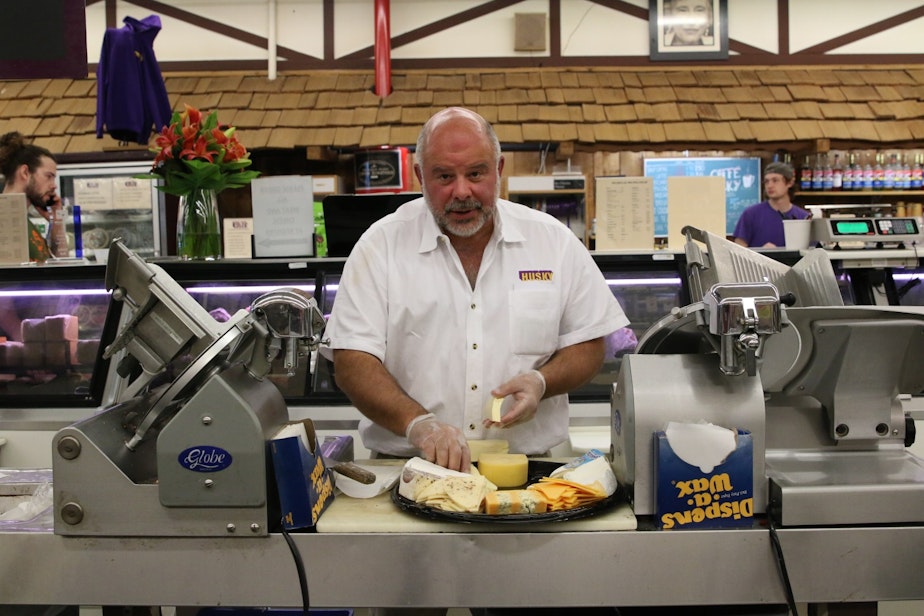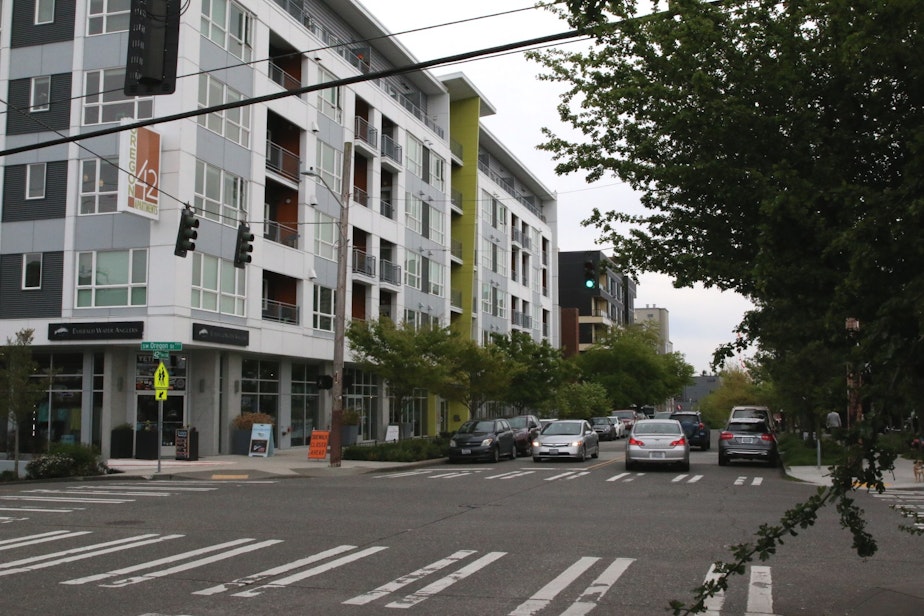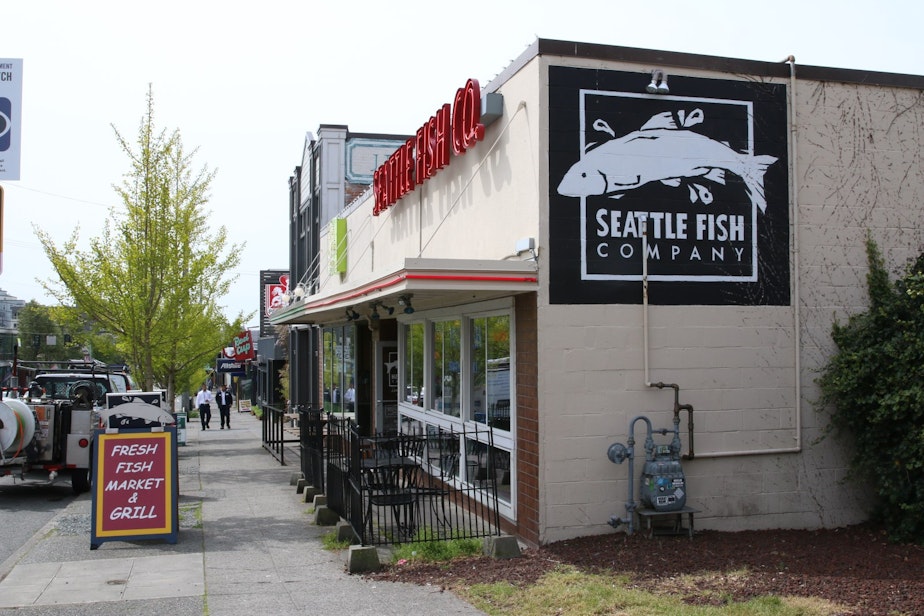This West Seattle parking lot is chock-full of drama

Seattle is famous for its neighborhoods, but epic growth is bringing big changes, and lots of tension. One area in particular where tensions are rising : parking lots. They’re an obvious place to build housing, but merchants need them to draw customers.
The two different ways of looking at parking lots has led to a sort of culture war in the West Seattle Junction neighborhood. “They’re not just parking lots – but they’re part of the culture of the junction,” said Lora Radford of the West Seattle Junction Association.
Control of one parking lot – and its future – is so dramatic, it looks like an episode of Game of Thrones. Let’s call our imaginary hit HBO series – the "Game of Land Use."
Episode 1 opens with a battle scene in the 1950s. Commercial business districts like the West Seattle Junction were fighting to survive. Their customers were being lured away by Northgate... you know, the kingdom to the north. It had brought a new way of shopping to the region and reshaped the balance of power.
The business owners in the West Seattle Junction got together and asked: What does this mall have that we don’t have?
The answer was parking. In the age of the auto, cars were the conduit for cash. To participate in that economy, merchants had to bend the knee to the automobile by offering them space to park.
Sponsored
And so the merchants called on the community for help. “The business owners would literally go from door to door, knocking on each door, asking people to chip in a few bucks to pay for the taxes and the maintenance of the parking lots,” said Lora Radford, director of the West Seattle Junction Association.
Radford said people donated enough land and money to fund several parking lots. That’s how the West Seattle Junction survived the threat of the mall.
The hundreds of community members who now owned shares in the parking lots passed their shares down from generation to generation.

Cut to the 2000s, and that peaceful period was nearing its end. An old family that owned land all up and down the Junction got into deep financial trouble. Their properties were all sold off, and their shares in the parking lots were up for grabs.
Sponsored
A developer scooped them all up, and started building alliances. “And that’s when things really started to heat up.” said Radford.
Neighbors reported seeing surveyors around the biggest of the parking lots. They feared the developer wanted to put something tall there, somethingwith little or no parking.
The developer wouldn’t talk to me. But he certainly would not be alone if he believed there was a better use for that land than as a parking lot.

One person who feels that way is Matt Hutchins. He’s an architect who lives in West Seattle. “In the past, cities, towns and main streets have thought that they had to cater to the car because that’s the way that customers were really coming to them," he said. "Today, we have rapid bus service, we have light rail coming to West Seattle.”
Sponsored
Hutchins said says there are probably 40,000 people living within a 20 minute walk of the Junction, now. He says all those people can sustain a healthy neighborhood business district without all the cars. If true, that makes parking lots in places like the West Seattle Junction a relic of a former age.
“In an urban village, I tend to think of every surface parking space as an opportunity missed,” Hutchins said. "A missed chance to build more housing, or more office space, or more little shops," things Hutchins said add to the vibrancy of urban villages.

Back at the West Seattle Junction, the parking lot shareholders who favor development had consolidated enough power that no one could challenge them. “So they are able just to revote themselves in, year after year,” Radford said.
But the merchants still had one more layer of defense. We’ll skip the details, but in a very dramatic way, they managed to push through a lease that promised the land would remain as parking lots for 20 years. It seemed like they were safe. But then property taxes rose, like they did all over Seattle.
Sponsored
The merchants would need to charge for parking in order to cover their rising costs. But their landlords said: read the fine print on your lease. You can’t do anything on this land without our permission.
The merchants were like the inhabitants of a castle under siege. And it seemed that seige would be lost unless the shareholder group showed mercy.
“They are holding the lives of hundreds of small business owners in their hands," Radford said of the shareholders.
The merchants started to freak out. Camille Cage, who works at a local antique store, told me how her customers use the free parking lot. “It’s really crucial," she said. "There are times when the street parking is full... almost always, actually. And if they can park for a few hours for free back there, they have time to poke around the antique mall. If we didn’t have that free parking and easy access in and out, we’d lose business. That’s the bottom line.”
Travis Robinson, who manages the Elliot Bay Brewery, told me “we’ve been here 22 years and we’re built on regulars and some of them have moved farther away, and they still come, and they expect those 3 hour lots to be there. So if they weren't, it could definitely change us some, for sure.”
Sponsored
And it’s not just merchants. The Senior Center too, feared for its survival. Staff member Holly McNeill said many seniors park in the free lot. “I know we’re moving into a hopefully more mass transit world, but our cities haven’t been built for that,” she told me.
But to build for that... sometimes means building on parking lots. And it’s unclear what role parking will have in the buildings that replace them. In urban villages near good transit, parking isn’t even legally required.

Conflicting views over the long term future of the lots, and how much to prop them up in the short term, came to a head at a meeting between the two sides. Jon Daniels was there. He’s a fishmonger in the neighborhood, and a relative newcomer to this long simmering war. “I could see that there was drama going in there and it’s been going on for a long time," he said. "I got the feeling real quick that this battle had been going on back and forth.”
But the meeting failed to resolve the impasse.
The merchants tried going around the controlling shareholders, raising money in whatever way they could. Travis Robinson of the Elliot Bay Brewery told me “We had a beer where you could round up a dollar to go to the parking lots and stuff like that.” And the beer was called: "The Parking Lot Pale!" Robinson said, laughing.
But it wasn’t enough. So the merchants had to bend the knee before the developers.
As they approached the iron throne, they put forward their best arguments: We are clear eyed about the future. We’ve never been against development. We just want to make sure what gets built includes enough parking.
But they know that there’s a dragon just over the horizon, ready to enter the battle. Sound Transit may show up soon, looking for land for a light rail station and holding the power of eminent domain. It could shake up everything. And it’s a good reminder that we might look back on this conflict very differently, in 30 years.
The fishmonger, Jon Daniels, was talking to his daughter recently, shortly after she turned 16. "I said, do you want to talk about getting a car – and she said 'No,'" he recalled. "And I was like, 'Wow, first thing when I was your age, I was at the DMV getting a license and I had been saving up for a car.' But the world’s changing.”
Someday, this current struggle over the future of these parking lots may sound like an old story from ancient history.

